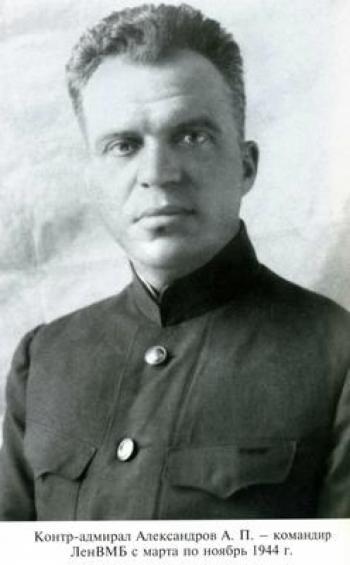Aron Barr was born in 1900 in the city of Oryol.
After the Revolution of 1917, Aron Barr changed his Jewish first and last names to the Russian-sounding "Alexander Alexandrov". Swept by revolutionary romanticism, he became a Red Guard, and a year later he joined the navy.
In the years of the Russian Civil War and its aftermath, Alexandrov served as secretary of a Party organization, commander of a Communist Naval Battalion, chief and commissar of the Black Sea water transport, and commissar of a cavalry regiment. He later served in the investigative bodies and military tribunals of the Soviet Navy.
A military career required an education, and in 1927 Alexandrov graduated from the Naval Academy in Leningrad. He went on to serve in the Baltic Navy, first as commander of the battleship Marat, and then as first mate on a destroyer.
At the age of 28, Alexandrov began to teach at the Naval Academy, simultaneously completing postgraduate courses for senior officers at the Mikhail Frunze Military Academy. In 1931, Alexandrov served for half a year as commander and military commissar aboard the cruiser Aurora, which had acquired legendary fame in the USSR, becoming a symbol of the Bolshevik Revolution. In 1936, he became the acting head of the Naval Academy, which had by that time been named after Kliment Voroshilov, the People's Commissar for Military and Naval Affairs and a member of Stalin's inner circle. In 1937, during the Spanish Civil War, many military specialists were sent to Spain to assist the Republican government. Alexander Alexandrov was one of them. After serving there for three months as advisor to the commander of a flotilla, he returned to the USSR. The "Great Purge" was then getting underway, and Alexandrov was fired from his job, and arrested several months later. Shortly after the outbreak of the Soviet-German War, he was rehabilitated and returned to his former post. Alexandrov went on to command the Azov Military Flotilla, which took part in the defense of the Crimea. However, in October 1941 he was demoted for breaches of discipline, rearrested, and discharged from the Navy. A two-month-long investigation ensued, and in the end he was released and appointed section head in the History Department of the Central Naval Staff in Leningrad.
In September 1942, Alexandrov, who was then Chief of Staff of the Ladoga Military Flotilla, took part in an operation that involved the crossing of the Neva River near Nevskaya Dubrovka. From June 1944, he was commander of the Leningrad Naval Base.
In December 1944, Rear Admiral Alexander Alexandrov served as vice chairman of the naval subcommittee of the Allied Control Commission in Finland. Over that time, he arranged the shipping of 250 tons of captured enemy equipment to the USSR. For this, he was awarded the Order of Lenin. In the course of the war, Alexandrov was awarded three Orders of the Red Banner; the Order of Nakhimov, 1st class; the Order of the Patriotic War, 1st class, and medals.
Alexander Alexandrov died in a plane crash in January 1946, while on a work-related flight to Berlin.







